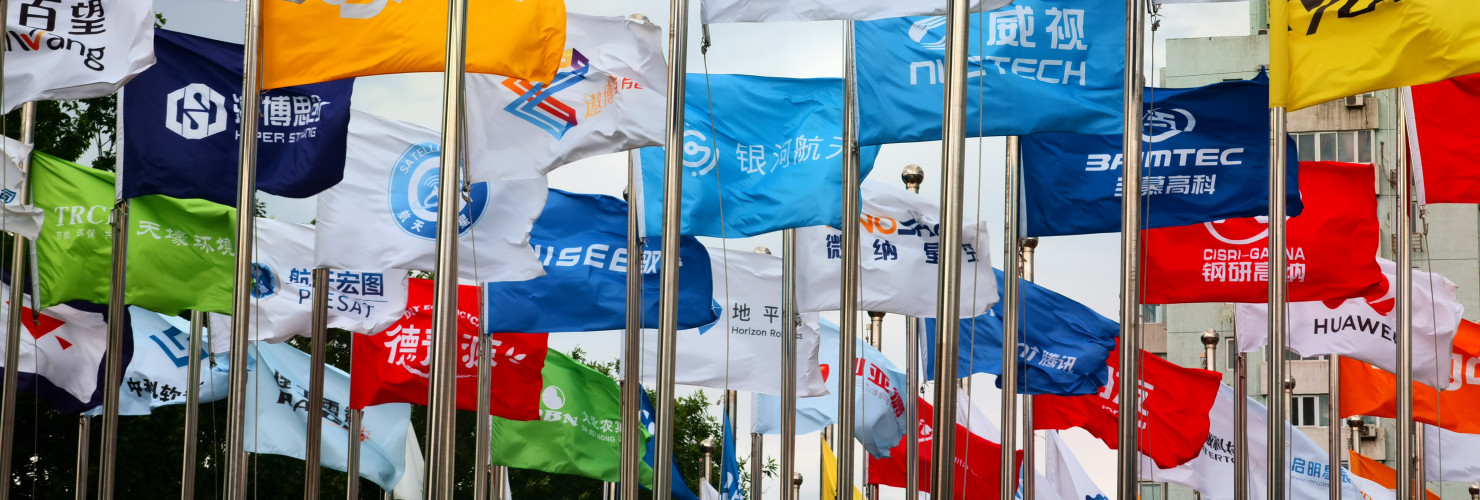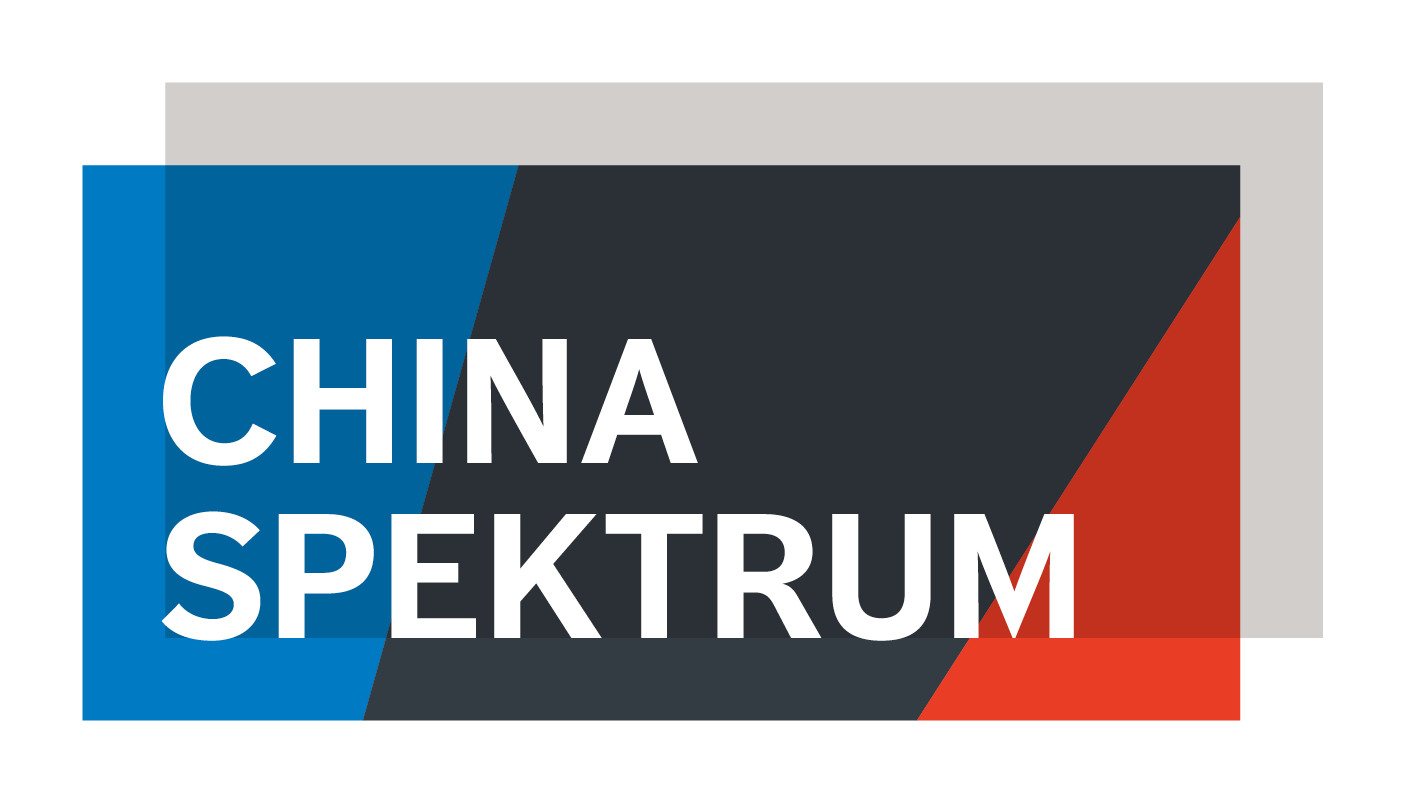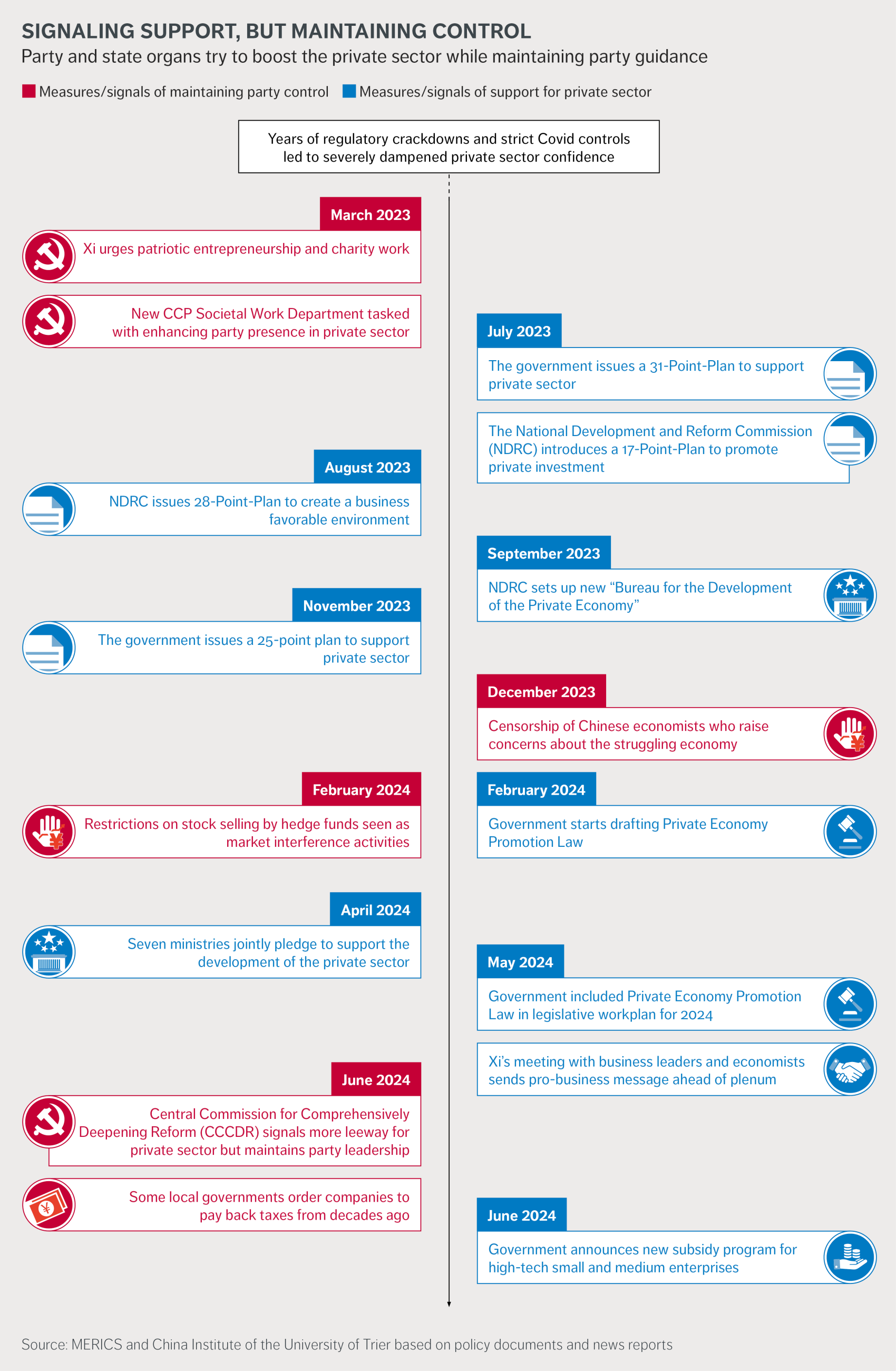

Ahead of the Third Plenum, diverging visions for China’s private sector
Summary:
- At the Third Plenum, a key policy meeting, the Chinese Communist Party (CCP) will set China’s economic program for the next five years. The struggling private economy is an issue of concern given its relevance for economic growth, tax revenues, job creation.
- Despite a series of policies and measures to support the private sector, steps taken so far have not been effective in rebuilding confidence.
- Economic experts have diverging views on what the best measures for sustained growth are: One side points to stronger state guidance and collaboration between private and state-owned enterprises. The other calls for structural reforms for fair competition and a more predictable political and legal framework to revitalize entrepreneurial spirit.
- Observers of the Plenum should pay close attention to what steps the party state will take to rekindle trust in the private sector. The path ahead is crucial for China’s businesses and foreign companies doing business in and with China.
 This analysis is part of “China Spektrum,” a joint research project with the China Institute of the University of Trier (CIUT) funded by the Friedrich Naumann Foundation. As part of this project, we analyze expert and public debates in China. Learn more about the project and find previous publications here.
This analysis is part of “China Spektrum,” a joint research project with the China Institute of the University of Trier (CIUT) funded by the Friedrich Naumann Foundation. As part of this project, we analyze expert and public debates in China. Learn more about the project and find previous publications here.
As economic challenges loom, Chinese experts discuss their country’s private sector and how to boost its economy again. These voices broadly represent two groups – one that reflects current party policy with a high level of saliency in public discourse, and another, a well-established but now-marginalized cohort representing market-leaning reformers, aiming to address the crisis of confidence in the private sector. With the announcement of the CCP’s long-delayed third plenum that usually sets out China’s economic program for the next five years, now is a good time to take stock of these ongoing debates, ones that will not end after the major gathering in July.
The most recent quarterly economic data suggest a more stable growth after a difficult 2023. Still, major challenges affecting the sustainability of China’s economic system remain. These include a struggling real estate sector, piling local government debt, regional inequalities, and a decline of private sector investments in recent years.
The struggling private economy is an issue of concern for the Chinese leadership, given its relevance for economic growth, tax revenues, job creation, and not least for China’s innovation capacities. Compared to pre-Covid years, slowing growth has caused companies to face economic difficulties. So too, confidence of private entrepreneurs has been shaken and not just since the chaotic exit from China’s rigid zero-Covid policy at the end of 2022. The CCP under Xi Jinping has prioritized state-owned enterprises (SOEs), implemented stricter regulations, increased its control, cracked down on the tech-platform sector, mandated patriotism and coerced enterprises into making “donations” – a token gesture to achieve social and economic equality.
Despite a series of government policies and measures signaling support for the private sector, those in the sector itself tell a different story. Results of a survey among Chinese private enterprises initiated by Beijing Dacheng Enterprise Research Institute, a private non-commercial organization, at the end of March reveal that steps taken so far have not been effective in rebuilding confidence.
Asked about reasons for the decline of private sector investments, 75 percent of the companies surveyed say it is because of business difficulties and declining profitability, while 69 percent believe entrepreneurs lack confidence in future economic development. 39 percent expressed a more uncertain and risky policy environment as a reason. Interestingly, 47 percent of companies surveyed mentioned the issue of overcapacities in some industries – a hotly contested topic in China’s trade relations particularly with the US and EU. Foreign companies also see a worsening business environment in China, as indicated by the latest Business Confidence survey of the EU Chamber of Commerce in China.
Experts have diverging views on what are the best conditions for growth
Chinese expert debates reveal diverging views of what is needed to reinvigorate and maintain economic growth, specifically when it comes to the role of the private sector and how it relates to China’s innovation potential. These debates take place in a highly controlled media environment, where since last year the leadership has increasingly censored critical analyses on the state of the economy and explicitly formulated a goal to improve “public opinion guidance” on this issue . Nonetheless, within this context a systematic reading of positions and assessments can help better understand the challenges at hand and assess potential future directions of China’s economic policy.
For this analysis, the author reviewed 30 articles published from January to May 2024 on the academic online debate platform Aisixiang and in economically-liberal-leaning finance outlets like The Economic Observer or Caixin as well as selected economy-focused and publicly available WeChat accounts. While they only reflect a small sample, they still provide helpful insights to ongoing debates.
Party-aligned scholars: Synergies between state and private enterprises will achieve national goals
Beijing has proclaimed transitioning to a new “high-quality growth model” built on innovation and high-tech sectors as a major goal. More party-aligned scholars argue for a synergetic relationship between state-owned and private enterprises, where the innovation potential of the private sector should be used to achieve national goals.
For Wang Song from the Central Party School, the state-owned and private sectors must work together, focusing on their respective roles. While the state sector should be promoted in areas related to strategic emerging industries, national security or public services, it is the flexibility and efficiency of the private sector that needs to be further stimulated. To achieve innovation goals and create “a good innovation ecology,” Wang envisions the establishment of “collaborative innovation consortiums” where state-owned and private enterprises work in tandem with research institutions.
Zhang Yaguang from Peking University claims the fundamental task facing China’s economy in the future lies in “breaking down the obstacles that hamper the development of new quality productive forces”. He acknowledges that the “innovation capacity of the private economy plays an important role in the transformation and upgrading of industries and technology breakthroughs.” Private entrepreneurs should be supported and encouraged to participate in government projects aimed at developing new quality productive forces, says Zhang, but he doesn’t offer a clear solution how the long-lamented lack of equal access to funding and public projects for non-state enterprises can be overcome.
According to Yang Ruilong, from Renmin University, the state-owned and private economy should “promote each other,” and mixed ownership should be fostered. He rejects the framing of decades-long discussions on China’s economy that state-owned enterprises have been advancing while the private sector retreats (国进民退). Instead, he suggests that state and private sector advance together (国民共进). Yang believes “one should not rely solely on the market mechanism” and that “state-owned enterprises have unique advantages in solving market failures and transitioning to a new innovation-driven economic development model”, as they can prioritize long-term objectives over short-term profit and keep people employed. Also, for Yang “global competition requires stronger, better and larger state-owned capital and state-owned enterprises.”
Some, such as Lin Yifu from Peking University, point to “external conditions,” such as weak global demand, being the core of China’s current economic woes, rather than a preferential treatment of SOEs and insufficient support for the private sector. In his view, first clarifying this and then countering external downturn pressures through state investment and proactive fiscal policy will restore confidence in government policy, encourage entrepreneurs to boost investment and innovation to help maintain China’s growth rate.
Market-economy-leaning experts: Boosting low confidence of private entrepreneurs is key
For the market-economy-leaning experts, “low confidence” (信心不足) among private entrepreneurs is the crucial issue. Their proposed solutions focus on the kind of political and economic environment the private sector needs to thrive again.
According to Sun Liping, retired professor from Tsinghua University, a lack of confidence in the future, the burden of debt and political and regulatory uncertainties are all reasons why companies are reluctant to take out loans and invest. But for him the root of the problem is the compressed and narrow space for opportunities caused by oversupply and the resulting undercutting competition. In his view, if this is not properly solved, confidence will not improve.
For a modern market system that inspires innovation and entrepreneurship, it is “necessary to start from the political, economic and legal aspects, relying on reforms that are market-oriented, based on the rule of law and internationalization,” argues Wu Jinglian. His liberal reform approach calls for implementing competition policy and tackling other urgent economic and policy problems to restore confidence in the private sector. Wu was key in shaping crucial economic reform policies under the State Council in the 1980s and 1990s and still actively contributes to the debates at 94 years of age.
In a similar tone, a predictable political and legal environment, where state power is not abused, rights and interests of enterprises protected, and policies effectively implemented are key for Chen Jian, a guest researcher at the China Society of Economic Reform. He calls for a market economy and fair competition between SOEs and private enterprises as well as a more favorable public opinion environment in which private enterprises aren’t condemned by parts of society for their perceived wealth and lack of patriotism.
Wang Xiaolu sees political reforms lagging behind economic reforms. Doubts about the direction of market-oriented reforms have led to an unclear understanding about the status and role of private enterprises according to the Researcher and Deputy Director of the National Economic Research Institute, one of the few remaining somewhat “independent” research institutes.
The politics of China’s future economic path
Current economic debates reflect fundamentally different visions for China’s economic system that touch upon the overarching question of the state and private sector relationship: One calls for stronger state-owned companies that integrate the private sector’s merits, while ignoring how state intervention has already harmed their situation and trust. The other one believes that China’s strong entrepreneurial spirit can only be revitalized with a market that has a more predictable political and legal framework.
The experts’ arguments are not new. Under Xi’s administration, the latter position, now almost only heard from an older generation of by-gone experts, has lost ground in policy circles and on public forums. Compared to the past, what we can publicly see now, the debate is more siloed and less interactive, where both sides talk past each other.
At the upcoming Third Plenum, observers should pay close attention to whether the party will try and further integrate SOEs and the private sector or roll out substantial steps to rekindle private sector trust. Current signals from the leadership suggest that they want to reconcile the irreconcilable: Strong state-owned enterprises with modern corporate governance structures, and a dynamic and resilient private sector, with the party playing a leading role in both. The path the party will outline is not only crucial for China’s citizens and business sector but also for foreign companies doing business in and with China.
Equally, this has global implications: the already heated debate over Chinese manufacturing overcapacities shows the importance to rekindle domestic entrepreneurship, income development and private consumption. If Beijing continues to just focus on state-driven industrial policies and exports, trade tensions with the US and EU are likely to increase.

